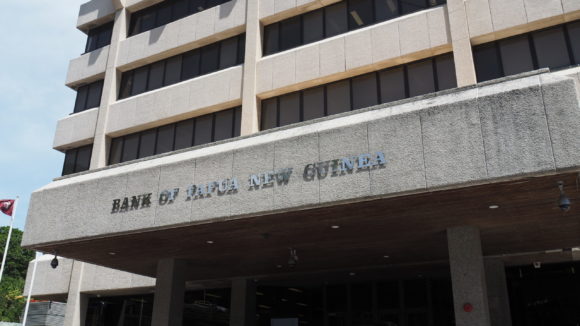The Bank of Papua New Guinea expects a ‘windfall’ from higher international commodity prices to alleviate some of the country’s foreign exchange shortages. However, anecdotal evidence suggests the forex situation is actually getting worse. Business Advantage PNG asks business leaders what’s going on and how long it is set to continue.

‘Higher international prices of PNG’s export commodities have resulted in increased tax revenue to the government and higher foreign exchange inflows, particularly from the mineral sector,’ said Acting Central Bank Governor Benny Popoitai in his most recent Monetary Policy Statement, released earlier this month.
For businesses waiting for foreign exchange, this should be good news.
However, anecdotal evidence suggests the forex situation in PNG is getting worse, with some businesses in PNG waiting up to eight weeks to have their forex orders filled. Indeed, both the Port Moresby and Lae chambers of commerce have nominated forex shortages as the number one issue facing their members. This is affecting not only businesses’ ability to pay for imported goods and services, but also the repatriation of profits, which has been stalled for years.
First come, first served

The Institute of National Affairs’ Paul Barker.
‘Forex continues to be a big issue,’ Paul Barker, Executive Director of industry-funded think-tank, the Institute of National Affairs, tells Business Advantage PNG. ‘There’s meant to be more forex in the system but the way the funds are released is part of the problem.’
According to the Central Bank, there were outstanding forex orders amounting to K614.9 million at the end of August.
Currently, Barker says, forex is released by the central bank to PNG’s retail banks on an established quota basis, rather than a competitive basis. The amount of foreign currency released by the Central Bank is also an issue.
‘The central bank has been pumping about US$50 million into the market each month. That really needs to double,’ Rio Fiocco, President of the Port Moresby Chamber of Commerce and Industry, told Business Advantage PNG recently.
The funds are certainly there: PNG’s foreign reserves mid-year stood at US$3.296 billion (K11.6 billion), according to the Bank of PNG’s latest Quarterly Economic Bulletin. This is enough for over nine months of import cover.
‘If you don’t release the forex, you won’t get the trade or the investment.’
While he appreciates the Bank of PNG needs to be cautious about letting this figure fall too far in the face of volatile global markets, Barker feels six months import cover should be adequate.
‘If you don’t release the forex, you won’t get the trade or the investment.’
Recent due diligence measures introduced by the Central Bank, while designed to address some abuses of the system, also appear to have made it harder to obtain forex.
In July, it started asking for more documentary proof from forex dealers that their orders were genuine, which had the effect of reducing forex transactions by 38.4 per cent in August. A large number of orders, in the words of Acting Governor Benny Popoitai, ‘did not meet the compliance requirements.’
Impact

The Manufacturers Council’s Chey Scovell.
With strained global supply chains already struggling to meet demand, the consequences of also having to wait for forex are serious for many businesses, particularly those – such as manufacturers – that rely heavily on imports to keep their businesses productive.
‘PNG used to be able to get its goods on very good terms, supplied on credit,’ observes Barker. ‘But, since forex hasn’t been so available, suppliers want payment up front, or on less favourable terms.’
Chey Scovell, Chief Executive Officer of the Manufacturers Council of PNG, doesn’t hold back.
‘Our global reputation for being able to pay is mud,’ he tells Business Advantage PNG. ‘A letter of comfort from your bank saying you’ve got millions of kina sitting here – free cash – doesn’t mean anything. Overseas suppliers just want to know that they can get paid when you need to pay the money.’
Due to supply constraints, Scovell says, PNG’s manufacturers are being forced to hold more stock than usual at a time when import costs are increasing, which in turn is putting pressure on them to increase prices.
Businesses of all sizes are affected by the forex squeeze.
‘The situation for us is not getting any better but we continue to maintain dialogue with the Government and BPNG,’ says Hulala Tokome, Country Manager and Director for Puma Energy. Puma is PNG’s largest importer of fuel – a commodity priced in US dollars – which consequently makes it the country’s largest purchaser of foreign exchange.
The solution?
While higher commodity prices this year have helped PNG somewhat, Barker notes these may have peaked. Longer term, business may have to wait for major resources projects – most notably a re-opened Porgera gold mine and the anticipated TotalEnergies-led Papua LNG project – to start before there is substantial forex relief.
‘If Porgera had been operational earlier, that would have brought in [overseas] revenue but clearly that’s taking a lot longer,’ says Barker. Porgera now looks like re-commencing gold exports next year, while the final investment decision on Papua LNG won’t be until the end of 2023.
That said, he does note a ‘bit of confidence’ returning to the economy, with early works and recruitment for both projects starting to take place.








Speak Your Mind